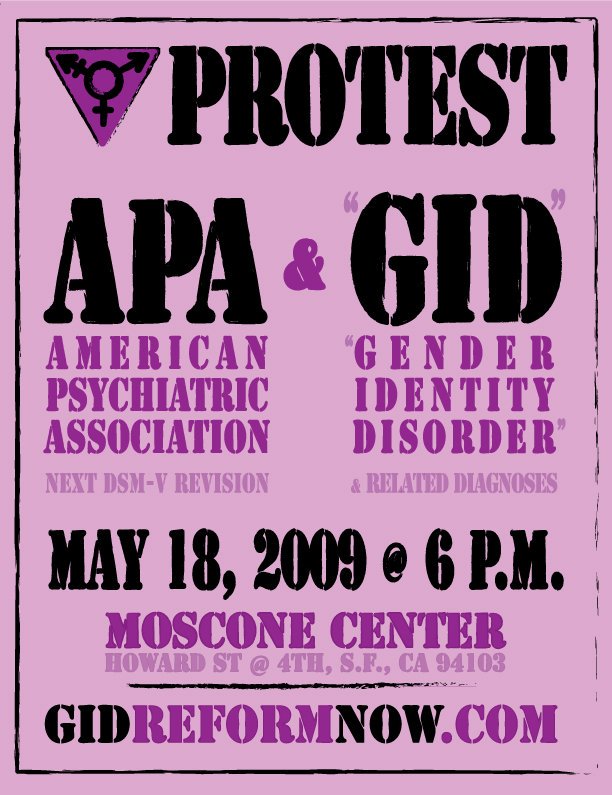The American Psychiatric Association (APA) is a trade group for psychiatrists in the United States. The APA is a key historical source for anti-transgender disease models to describe transgender people.
The APA publishes the Diagnostic and Statistical Manual of Mental Disorders.
In 2023, APA took some steps in improving their reputation by publishing the book Gender-Affirming Psychiatric Care. Anti-trans group FAIR in Medicine attacked the decision, publishing an open letter signed by many key figures in anti-transgender extremism.
History of anti-transgender oppression
Some mental health trade groups currently consider trans and gender diverse people to be mentally ill. Until 1973, they also considered homosexuality a mental illness, and it took many years for academics and political activists to debunk all the bogus “science” and get this changed.
In 1973, the APA voted to remove homosexuality from their Diagnostic and Statistical Manual of Mental Disorders (DSM).
Subsequently, a new diagnosis, “ego-dystonic homosexuality,” was created for the DSM’s third edition in 1980. This meant someone who had “distress” about their sexual orientation.
Gregory M. Herek, Ph.D. writes:
“The new diagnostic category, however, was criticized professionally on numerous grounds. It was viewed by many as a political compromise to appease those psychiatrists – mainly psychoanalysts – who still considered homosexuality a pathology. Others questioned the appropriateness of having a separate diagnosis that described the content of an individual’s dysphoria. They argued that the psychological problems related to ego-dystonic homosexuality could be treated as well by other general diagnostic categories, and that the existence of the diagnosis perpetuated antigay stigma.”
In 1986, the diagnosis was removed entirely from the DSM. The only vestige of “ego-dystonic homosexuality” in the revised DSM-III occurred under “Sexual Disorders Not Otherwise Specified,” which included persistent and marked distress about one’s sexual orientation.
The DSM 4th Edition (DSM-IV) was published in 1994, followed in 2000 by the DSM IV, Text Revision, or DSM-IV-TR. These editions include “transvestic fetishism” and “gender identity disorder” (GID) as disorders.
As Katherine Wilson, Ph.D. notes:
“Recent revisions of the DSM have made these diagnostic categories increasingly ambiguous, conflicted and overinclusive… The result is that a widening segment of gender non-conforming youth and adults are potentially subject to diagnosis of psychosexual disorder, stigma and loss of civil liberty.”
For an excellent overview on the DSM’s role in pathologizing sexual orientation, check out Facts About Homosexuality and Mental Health on the UC Davis website. There are many similarities in the way psychology views being trans and gender diverse, and it will be useful in creating a long-term strategy for working with progressive psychologists.
Depathologizing gender diversity
For context on the process, see this transcript of a 2003 panel chaired by Dan Karasic and Jack Drescher. Presenters were Darryl B. Hill, Katherine Wilson, and Charles A. Moser. Discussants included Paul J. Fink and Robert Spitzer.
The fight over the fifth revision (DSM-V) came at a major turning point in transgender activism. After the APA announced non-psychiatrists Kenneth Zucker and Ray Blanchard would be involved in writing the sections that affected our community, we staged protests and campaigns throughout 2009 to minimize their involvement and the promotion of their ideology in the revision.

See GID Reform by Kelley Winters, Ph.D. for more on this.
References
FAIR signatories (December 28, 2023). Open Letter to the APA. https://www.fairforall.org/open-letters/open-letter-apa/
Resources
GID Reform (gidreform.org) [archive]
American Psychiatric Association (psychiatry.org)
American Psychiatric Association Publishing (appi.org)
American Psychiatric Association Foundation (apafdn.org)
Psychiatry Online (psychiatryonline.org)
Facebook (facebook.com)
Twitter (twitter.com)
LinkedIn (linkedin.com)
- American Psychiatric Association
- linkedin.com/company/american-psychiatric-association
YouTube (youtube.com)
Wikipedia (en.wikipedia.org)